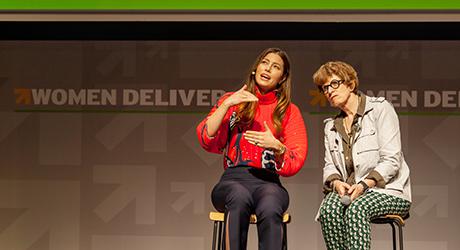
“Rights are not a system of endorsement or appreciation; they are not an award or a test result or an indicator or a target. They are not a beauty parade,” said Deputy High Commissioner for Human Rights Kate Gilmore. “Rights are for the best of us and for the worst of us, for each of us to the exclusion of none of us in the interest of all of us.”
Gilmore made her statement as part of the closing session of Women Deliver 2016, a global conference on women and girls’ health and rights. The conference, which has been held every three years, brought together thousands of activists, NGOs, government officials and United Nations Agencies to focus on how to implement the UN sustainable development goals to best serve women and girls.
For its part the UN Human Rights Office has worked on a variety of fronts to increase the understanding of the link between worsening health for women and girls and the historic denial of their human rights of women and discrimination.
In 2012, the Office developed guidance to apply a human rights based approach to reducing preventable maternal mortality and morbidity. This guidance provides concrete advice on the specific measures required in order to operationalize human rights in the context of women’s sexual and reproductive health rights, including for instance, in looking at whether budgets correspond to human rights obligations, examining implementation in practice, and ensuring strong accountability mechanisms.
Coming to the conference was a chance to share how human rights should be embedded in discussions of women and girls’ health, said Jashodhara Dasgupta, convenor for the India-based NGO SAHAYOG. Her group has been active in promoting the Office guidance in India, and particularly the idea of budgets as a form of accountability for Government.
“Human rights need a material basis,” Dasgupta said. “Budget oversight by the parliament is a significant dimension of accountability, as it’s not just about policy announcements, but actually having the resources to deliver on the policies.”
For Ariel Friscancho, an activist who has been utilizing the UN Human Rights Office guidance in his work, the guidance has helped to strengthen the dialogue between health authorities and women leaders of communities. He says that the guidance also helped to provide entry points for improving community oversight of health services and addressing the power gap between doctors and rights holders.
“Mentioning that this tool exists has helped in the dialogue with authorities to reinforce human rights principles in healthcare delivery,” he said. “There is evidence in Peru that only half of all people in need of health care actually seek care because of lack of confidence in the services.”
Access to accurate information on sexual and reproductive health rights is essential across the board including especially for young people, Gilmore said.
“With the onset of puberty, for most boys, the choices multiply. And for most girls, they shrink, they contract, they minimize,” she said. “We cannot afford to leave in place unchecked the impediments to the realization sexual and reproductive health rights. These are matters of human rights. It is the rights of women and young people everywhere. And when we fail them, it is they who are paying for it with their lives and with their futures.”
Source: OHCHR
 FR
FR EN
EN AR
AR








